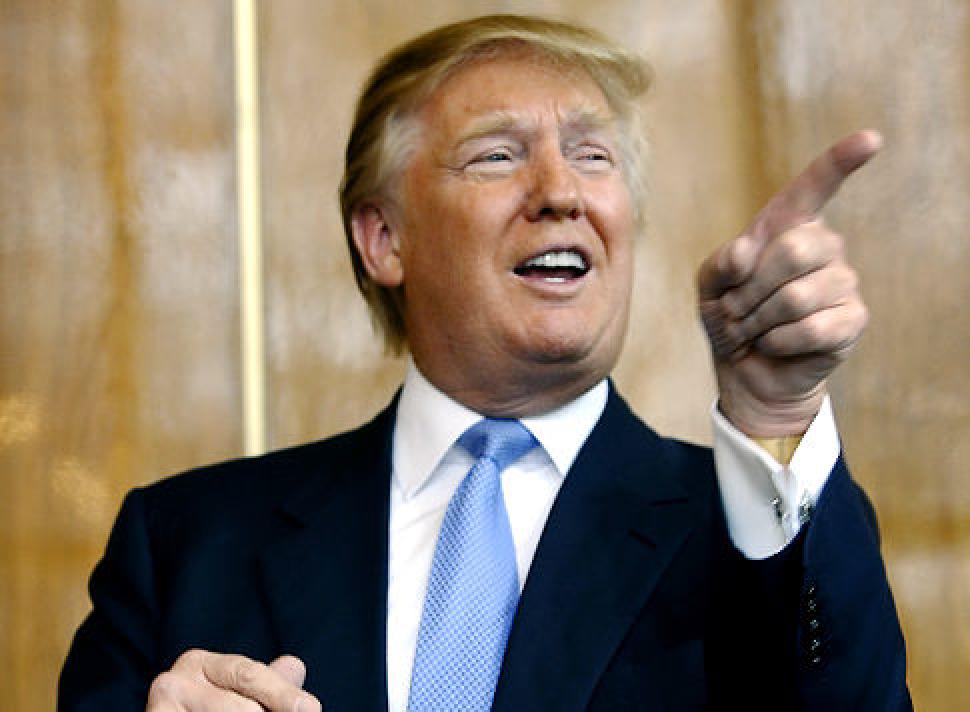
Donald Trump says he wouldn’t tear up the nuclear agreement with Iran if elected president because Iran would already have gotten its main benefit from the deal before he could take office—lots of cash.
Trump, one of 17 Republicans seeking the GOP presidential nomination, took an entirely different tack on Iran from all the other candidates. That, in itself, is not startling. But, in this case, his unique policy stand didn’t just have entertainment value but showed some shrewd analysis.
Several GOP candidates have said they would tear up the nuclear agreement on their first day in office, January 20, 2017.
But when Trump was asked Sunday if he would do that, he disparaged the idea of tearing up the agreement. “The problem is, by the time I got in there [in January 2017], they will have already received the $150 billion.”
Iran receives two primary benefits from the agreement—the lifting of EU and UN sanctions; and the release of about $150 billion in frozen assets.
Trump correctly makes the point that all the frozen assets will have been returned to Iran long before January 2017. He did not address the issue of sanctions.
Most of the 17 GOP candidates have said they would re-impose sanctions on Iran. But the biggest sanctions—barring US investment in, exports to and imports from Iran—are not being removed. Most of the US sanctions to be suspended are small ones, such as barring US visas to dozens of Iranians in the Islamic Republic’s nuclear program. Probably the sole major US sanctions being removed are those against Iranian banks.
(Another candidate, Sen. Marco Rubio of Florida, last week said he would re-impose US sanctions and “give the mullahs a choice: either you have an economy or you have a nuclear program, but you cannot have both.”)
The main benefit the United States gets from the agreement is its restrictions that hem in Iran’s nuclear program for 15 years. If the next president tears up the agreement, the Islamic Republic will be legally free to do whatever it chooses with its nuclear program. Trump did not address that point.
Instead, he focused on the financial aspect, an area he is most closely associated with.
Trump referred to the nuclear agreement as a “contract” and said he would treat it the way he treats all contracts he has signed as a businessman.
“I would police that contract so tough that they don’t have a chance,” he said on “Meet the Press,” presumably meaning Iran would not have a chance to violate it.
But Trump was astoundingly complimentary of the future of the Islamic Republic, both economically and politically.
“Iran is going to be unbelievably powerful and unbelievably rich and Israel is in big trouble,” Trump said.
“They are going to be such a wealthy, such a powerful nation, they’re going to have nuclear weapons. They are going to take over parts of the world that you wouldn’t believe and I think it’s going to lead to nuclear holocaust,” Trump said.
“The people that negotiated that deal, namely [Secretary of State John] Kerry and his friends, are incompetent,” he said.
The billionaire businessman added that as an entrepreneur, however, he was “good at looking at a contract and finding things in a contract even though they’re bad.”
In another stunning departure from the political norm, Trump said Middle Eastern countries like oil-rich Saudi Arabia and Iraq should pay the United States for the security services it provides.
He said the Iraqis should be given “something” from their oil fields but, in an apparent reference to Iraq War veterans, “we should definitely take back money for our soldiers.”
“We’ve had soldiers that were so badly hurt and killed,” he said. “I want their families to get something. Wounded warriors all over the place. They got nothing. And they can’t even say we had a victory.
Trump said Saudi Arabia is going to need help fighting against the kinds of militants who have targeted neighboring Yemen. He said he would assist the Saudis in that event, albeit reluctantly and for a price.
“We defend Saudi Arabia. We send our ships. We send our planes. Every time there’s a little ruckus, we send those ships and those planes. We get nothing. Why? They’re making a billion a day. We get nothing. And this is the problem with the world,” he said.
On other matters, Trump argued that he would end birthright citizenship—the constitutional provision that makes anyone born in the United States a citizen. Trump said “birthright citizenship [is] the biggest magnet for illegal immigration.” While there have been occasional instances of pregnant women coming to the United States in order to give birth, Trump must be the only person to believe birthright citizenship is the “biggest magnet” for illegal immigration. Jobs are actually the biggest draw.
Ending birthright citizenship has become an iconic issue for the rightwing since 2011. But Trump could not “end” birthright citizenship as he pledged since it is part of the US Constitution. In fact, presidents have no role in amending the Constitution. A change requires a two-thirds majority in the House and Senate and approval by the legislatures of three-fourths of the states.
Birthright citizenship was inserted in the Constitution as part of the 14th Amendment in 1868 when southern states began discussing laws that would deny citizenship to former slaves.
Trump also said he would impose mandatory deportation of all criminal aliens. That has been the Obama Administration policy for years. But some countries, such as Iran, refuse to accept deportees and there is nothing a US president can do about that.